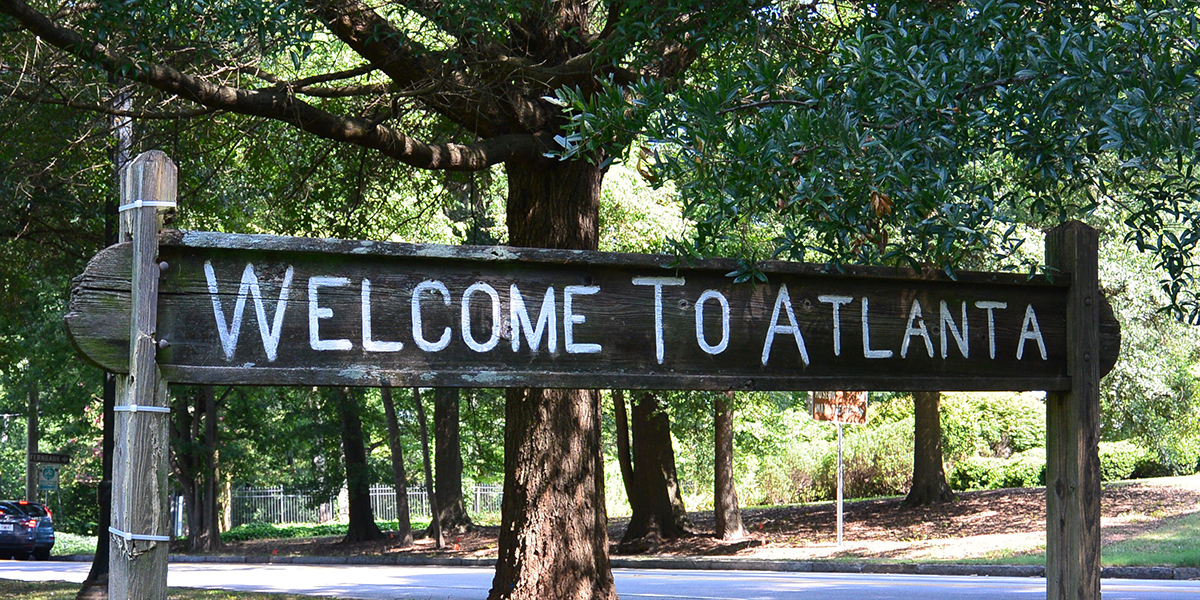This story is part of “Atlanta Remembers: The 1996 Olympics,” WABE’s series on the impact of the 1996 Summer Olympics on Atlanta, 20 years later. For more stories, click here.
It was September 1990, and the International Olympic Committee in Tokyo was about to announce the winning city to host the 100th anniversary of the games. Committee President Juan Antonio Samaranch of Spain addressed the crowd.
“First of all, I would like to express the gratitude of the Olympic movement to the six candidate cities, their countries and their people,” he said.
Maynard Jackson, mayor of Atlanta at the time, waited in the room, flanked with other city luminaries like former Mayor Andrew Young. Across the globe in downtown Atlanta, at Underground Atlanta, hundreds of residents gathered to watch the broadcast of the announcement.
“The International Olympic Committee has awarded the 1996 Olympic Games to the city of Atlanta,” Samaranch announced, bringing the globe’s eyes to a city in the American South.
The 1996 Olympics, by many accounts, put the city of Atlanta on the global map, but some question if that image has been sustained 20 years later.
Ken Bernhardt, regents professor of marketing emeritus at Georgia State University, said people were shocked. Athens had been in the running with Atlanta. Greece is the birthplace of the modern Olympics.
“At the time, Greece was the heavy favorite given that it was the 100th anniversary of the reincarnation of the Olympics,” he said.
Bernhardt said before the Olympics, there was no global brand of Atlanta.
“Pre-1996, there was no image of Atlanta. It wasn’t even on the international radar,” he said. “When someone said they were from Atlanta, they would have easily have people confuse it with Atlantic City.”
He said people would also not have known where Atlanta was unless they were told it was the home of Coca-Cola. But that all changed, he said, in the summer of 1996, when scores of reporters and spectators flocked into the city. Hours of TV footage were broadcast from Atlanta during a media blitz of 17 days.
Bernhardt said Atlanta had long-held aspirations of being an international city, but no one outside the metro area really thought it would be before the announcement.
“All of a sudden, people knew of Atlanta as an Olympic city along with some other very famous cities that have been Olympic cities,” he said, “so it put us in the big leagues for the first time.”
Atlanta resident Mark Sprouse remembers how his friends changed their view of Atlanta. He was a student at Georgia Tech in the early ‘90s from Germany and said that no one from Germany had thought about wanting to visit the city before the Olympics.
“Everyone’s like ‘No, I’m not – there’s no reason to go to Atlanta. It’s just Atlanta. It’s in the middle of nowhere, big town, etc. etc,’” he recalled.
But when he went back to Germany during the Summer Games, he said things had changed.
“I heard a completely different rhetoric. I heard people saying, ‘Well I didn’t realize there were mountains in Atlanta,” Sprouse said. “I think that the Olympics helped open people’s eyes to what else there was – what Atlanta was known for, what else was around.”
But the biggest international symbol Atlanta has always had is its airport and being a transportation hub, said Atlanta native Martin Deen. He said the games didn’t do that much for the city.
“I think the airport is what put Atlanta on the map,” Deen said. For companies wanting to move to Atlanta, he said he doesn’t think the Olympics influenced that at all.
Lisa Cooper, another Atlanta native, said she thinks the city has strived to be recognized and continues to struggle with a cohesive identity.
“Atlanta wants to be something bigger than it is. I don’t think they’re there yet,” she said. “Atlanta doesn’t stand for anything. The city just stands for nothing – you tear down all your historical places.”
Her co-worker, Javon Rogers, is from the Bronx, New York, and said he thinks the Olympics gave Atlanta a stage.
“Before the Olympics, there wasn’t a spotlight put on Atlanta. I would say the biggest city in the South that people focused on was Miami, and Orlando for Disney as a vacation spot,” he said. “So for Atlanta, I think that it brought a spotlight to it. The potential was there, and it just exploded.”
After the Olympics, Atlanta experienced a growth in population.
“It catalyzed a lot of things that were already taking place, but it made them happen in 10 years rather than what might have taken 20 or 30 years,” said Mary Rolinson, a senior lecturer of history at Georgia State University.
As for the image of the city, she said ever since the period after the Civil War, Atlanta has wanted to be the most important city in the South.
“Atlanta decided it did not want to be a place that was thought of as a place of racial conflict and violence, and there was a really conscious decision to try to work on Atlanta’s image constantly,” she said, “because to have an image that was negative would turn away any kind of investments and opportunities for growth and prosperity.”
Atlanta continues to protect that image. Its business leaders spoke out against a religious exemptions bill legislation this year, which they said would have made the city seem unwelcoming to the lesbian, gay, bisexual and transgender community.
Since the Olympics, Atlanta has become a more international city in more than just reputation. According to census data, the foreign-born population in the metro area grew from 116,624 in 1990 to 727,285 in 2014.

9(MDAxODM0MDY4MDEyMTY4NDA3MzI3YjkzMw004))








